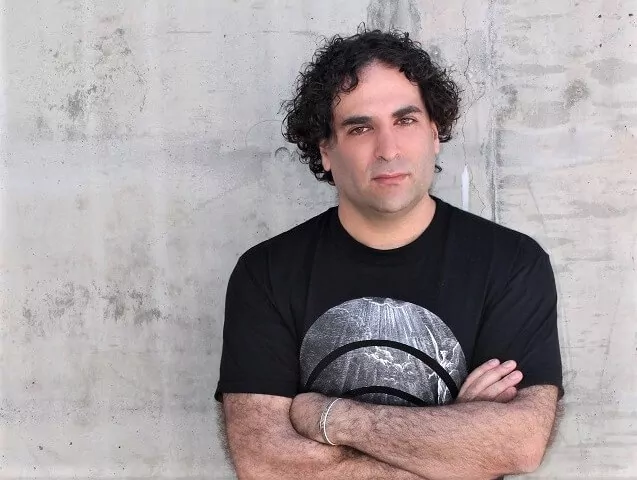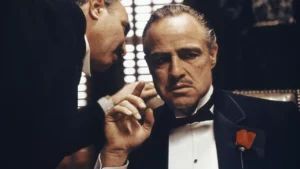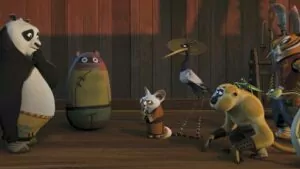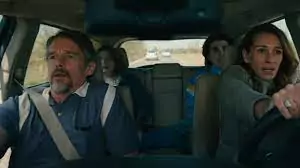
Michael Yezerski is an Australian music composer who has worked on several projects like Newcastle, Thursday’s Fiction and Blindspotting. He has composed and scored music for a variety of projects and has won several awards for his work.
Q. How did this collaboration come along and why did you choose Ambrose to be the person you wanted to work with?
Michael Yezerski: It wasn’t my choice although I would have made the choice of course, the pairing was suggested by the showrunners, Rafael Casal and Debbie Diggs. I knew of Ambrose and his work is very famous. He’s from Oakland and the show is set in Oakland.
When they called me, they said, “Would you be willing to work with Ambrose? I was like, well, why? And of course I’d be willing to work with him. That would be amazing” So, and, but they had this concept of, of, of Ambrose and I collaborating. So I took some of the sounds and the feelings that we developed for the film and paired it with the vision that Ambrose brings. And so that’s how we sort of created this fantastic club.
Q. What was the process of scoring or composing? The score for an adaptation of such an elaborate movie, which only released like two years ago.
Michael Yezerski: I always thought the feeling from the showrunners, who also created the movie that there was more of a story to tell. So it was never a surprise to me that they branched out into the series as it seems to be a natural medium for the story to continue to explore the characters in, and to explore the life of the city of Oakland.
We decided very early on what was that the sound. Of the movie and the melodic material or the themes musically of the movie, where we were going to put that aside, we’re going to leave all that behind, because these are new characters, even though it’s related. concepts as to how we score the movie in terms of the sort of sound design, the music, the, the sort of industrial nature of the music was going to carry over, but actual themes, melodies, that was all going to be definitely high because this is in a, in a sense, a new world. These are new characters, this is a new journey. and, and we want it to be true. Right.
Q. Ambrose has come in after the movie, so were there any inputs that you gave and gave to Ambrose before starting composing for the show?
Michael Yezerski: No. It was very much equal, Ambrose and I never wanted to.
It was very important to both of us, that it was an equal playing field. So there was not a senior composer and a junior composer. There was not like, well, you scored the movie, so you must know more about it. That’s not the nature of collaboration that would be, that would be exceedingly unfair. We sat down and talked for a long time. In fact, we were sort of talking for about seven months before we even started writing properly because just getting to know each other and getting to know our process.
So it was very equal from the start and we would look at a scene and we would say, what do you think? What do you think? How should we do this? The movie was long back. That was the past. That was all left behind. Everything was fresh. The other thing that I’ll say is that the nature of this process was there’s a lot of, of dance in the show and also had spoken verse, but the dance in particular. and so all of that had to be, or a lot of it had to be pre composed, like before, as they were shooting.
We were given a brief and then Ambrose and I would just like send ideas back and forth. I’m in Los Angeles, he’s in Oakland. And so we would just sort of record things and then send them to each other and the build on them and send it back. It was a really wonderful collaborator.
Q. Like you said, you’re making a show that’s based on completely different characters. How would you say that the music for the show differs from the score that you created for movie?
Michael Yezerski: It comes to mind in a way I’d say the music is a bit more heartfelt than the movie.
That’s not to say it doesn’t have sort of the fun or even the, sort of the harsher elements of the film score. The film had that sort of a hard edge in terms of the vibe, almost horror of scoring in it. It was also more on the comedic side of sort of a funk tone, at least in the first half, but the score for the television series is more emotive, it’s more emotional. It’s sort of deeper. It’s exploring sort of the inner complexities of these characters more. And I think a lot of that relates to the medium, like television, especially eight episodes of television affords you, not just the composer, but the screenwriters time to go deeper into these characters lives.
Q. Since you both come from different music backgrounds and composing is such a creative sort of process, were there, any creative defences between you both while you composed?
Michael Yezerski: Ambrose has a jazz background. He comes from completely different background. What instantly came was that I wanted to do something else and they wanted to post something, some big production terms of the score. That was actually the amazing thing about the collaboration. The funny thing is we come from different backgrounds. We come from different cities. I was born in Sydney, Australia, and then I moved to Los Angeles. We come from different parts of the world, but what is amazing is that Ambrose and I share a musical taste.
And as we were working, we sort of realized that we’re like, we agreed on everything, which is what made the collaboration so strong like even though we might sort of talk in a slightly different language, where we landed was always like, “that’s exactly what I would have done.”
There were really no disagreements to speak up. We gave each other the freedom to try different ideas, we sort of sat back and then if we would, you know, we could score a scene two different ways, but we would always sit back and look back and go, “you know what your idea is better.”
You know that’s the thing. It wasn’t competitive. It was staying true to the spirit in which we were brought together, which was, to create the very, very best score for the theme.
Especially like during a pandemic we spend a lot of time on the phone and the thing is we got to know each other as people in a really sort of deepened kind of a meaningful way that, I don’t think would be possible if it wasn’t for a pandemic. We might have just gone into a studio together and spent a few days and I’d see you later now that the music’s done.
It was definitely more intense in that sense. I mean in sort of musically intense, because you can go deeper into the ideas faster. We could send sketch of an idea. I would send it up to Oakland or he would send me. We will talk about it and then I would add something or he would add something and we send it back again. So it was like constantly evolving. If we had the ability to be in person, then I think the things would have happened faster in a way. We would have been in a studio for a couple of days and just like throwing some things together and that kind of would have been it. Whereas this way, we had the chance to evolve and I think the music is stronger.
Q. What sort of unique musical liberty is Blindspotting provided with as compared to other shows or movies that you might’ve worked on?
Michael Yezerski: We had an enormous canvas to work in this the show. It wasn’t just the dance. It was also diverse because of the characters. That requires the score as well. It was an incredible opportunity for a composer and a very rare opportunity. So I think that, especially in television you’re asked to create the classic sort of underscore, like you’re sort of underpinning the action. You are sort of reliant on the action to express the drama. The emotions almost restate through music whereas in Blindspotting, you’re actually actively expressing. Speaking about it in real terms, especially in terms of a dance or in terms of a ballet, the music defines the action in a ballet; the music creates an emotional arc that the dancers can then follow.
It’s just a very rare opportunity for a composer. It doesn’t happen very often, but the show runners and the producers trusted us enough to say, “here is a concept and whereabouts to shoot this. In a couple of days time, can you please give us a piece of music to work with?”
Yeah, it just automatically worked out. And I think that has to do with our collaboration and getting to know each other. Chatter is a song from episode four which transports audience into that sense of nostalgia.
Q. The last question was about this song, could you elaborate on how you made it?
Michael Yezerski: Well, I think that’s the classic example of what we’ve been talking about. So, we got a call, I think it was on Monday in November where they told us that they have just come up with this concept. An exploration of the characters childhood told through dance. They did this sort of movements and timings, but it was a sort of a walkthrough of what they finally wanted. They said, “this is what we’re going to do. and could you come up with something that expresses nostalgia childhoods, something that really immerses us in their emotion.” They had this decision on Monday and we had to shoot this by Wednesday.
We just immediately dropped everything else that we were doing and just started sending each other ideas. And it’s, you know, it starts as a very simple pace and becomes more complex as it goes on. And then it comes back to simplicity at the end. And I think that was the arc that we, that we wanted to express.
The Movie Culture Synopsis
Blindspotting is now available to stream on Amazon Prime Video and stars Jaylen Barron, Jasmine Cephas and Rafael Casal. It has 8 episodes and unlike the movie falls under the genre of comedy drama.



